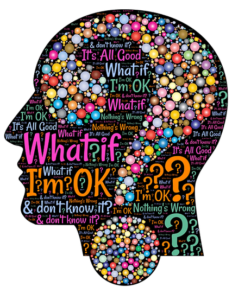If you have OCD, you may be experiencing violent thoughts. This is a common symptom of the disorder and can be very frightening. It is important to understand that having violent thoughts does not mean that you are a bad person. You are not alone in this experience, and there is help available. In this blog post, we will discuss what you need to know about violent thoughts in OCD. We will also provide information on how to get help.
Contents
What Are Violent Thoughts In OCD?

OCD, a popular acronym for Obsessive Compulsive Disorder, is characterized by intrusive and unwanted thoughts, images, or impulses that trigger intensely distressing feelings. People with OCD may try to suppress or neutralize their obsessions with compulsions. However, this only provides temporary relief and can actually make the obsessions worse.
Compulsions are repetitive behaviors or mental acts that a person feels compelled to do in order to reduce the anxiety caused by their obsessions. While compulsions may temporarily relieve anxiety, they ultimately reinforce the OCD cycle by increasing the person’s fear of their obsessions.
While the typical person with OCD may have obsessions about contamination, perfectionism, or harm, some people with OCD experience violent obsessions. Violent obsessions are intrusive thoughts that involve harming oneself or others. These thoughts can be extremely disturbing, harmful, and frightening. These thoughts can be so distressing that people with OCD may go to great lengths to avoid them. They may try to distract themselves, suppress their thoughts, or engage in compulsive behaviors. However, avoidance only makes the thoughts more persistent and distressing.
It is important to understand that having violent thoughts does not mean that you are a bad person. People with OCD are not actually going to act on their thoughts. It is the disorder that is causing the thoughts, not the person.
Examples
People with OCD may have violent obsessions about:
- Harming oneself or others
- Committing a crime
- Witnessing someone being harmed
- Being harmed by someone else
These can further manifest as:
- Intrusive thoughts or images of harming oneself
- Intrusive thoughts or images of harming others
- Doubts about whether they could hurt someone
- Fear of losing control and harming someone
- Avoidance of people or situations where they might harm someone
- Excessive self-monitoring for any signs that they might harm someone
It is also important to understand that not all people with OCD will have violent thoughts. Some people may only have obsessions about contamination, perfectionism, or harm. However, if you do have violent thoughts, it is important to seek help from a mental health professional.
What Are The Causes?

OCD is a rather complex condition that is not fully understood. However, it is thought to be caused by a combination of factors, including:
- Genetics: OCD tends to run in families, which suggests that there may be a genetic component.
- Brain structure and function: There are differences in the way the brains of people with OCD look and work when compared to those without OCD.
- Environment: It is thought that stressful life events may trigger OCD in people who are vulnerable to the disorder. For instance, the death of a loved one or divorce may trigger OCD symptoms.
- Other disorders: Mental disorders are a risk factor for developing OCD. For instance, people with anxiety disorders, and post-traumatic stress disorder (PTSD), among others, may be an additional risk factor.
- Trauma: Some people with OCD may have experienced trauma, such as abuse or violence. This is because trauma can increase the risk of developing OCD.
- Anger issues: Anger is a very natural emotion. However, some people may have difficulty expressing their anger in a healthy way. This can lead to problems, such as OCD.
- Exposure to violence: When a person is exposed to violence, it can increase their risk of developing violent thoughts in OCD. Let’s say, someone witnesses a violent event, such as a robbery or a car accident. This can increase their anxiety and make them more likely to have intrusive thoughts about violence.
These are some of the possible reasons and causes for violent thoughts in OCD. If you or someone you know is struggling with these thoughts, it is important to seek help from a mental health professional. They can provide you with the support and resources you need to manage your symptoms and live a happy and healthy life.
How Do They Affect Daily Life?

When one is constantly thinking of such disturbing and threatening thoughts, it is no secret that it can have a negative impact on day-to-day life.
- It can make it hard to focus on work, school, or other important tasks. This is because the person is preoccupied with their thoughts and worries about what might happen.
- It can also make it hard to enjoy time with family and friends or participate in activities that were once enjoyed. This is because the person may be avoiding people or situations where they think they might harm someone.
- It can be very isolating and lonely as the person withdraws from others. This is because one may constantly be on edge and feel like they need to be alert all the time. It can lead to problems in personal relationships as the person may be constantly arguing with loved ones or snapping at them.
- It can also lead to financial problems as the person may be spending a lot of money on things that they think will prevent them from harming someone. For instance, they may buy a lot of knives and then get rid of them because they are afraid of what they might do with them.
- The constant worry and anxiety can also lead to problems with sleep. People with OCD may find that they are not able to get a good night’s rest, which can further exacerbate their symptoms. Some other physical impacts of this condition can also include:
-Headaches
-Muscle tension
-Stomach problems
-Fatigue
All of these factors can have a negative impact on one’s quality of life. If you are struggling with violent thoughts in OCD, it is important to seek help.
How To Manage Them?
There is no one-size-fits-all treatment for violent thoughts in OCD. However, there are effective treatments available. There are many different treatment options available for OCD. Some people may only need medication, while others may need a combination of medication and therapy. One may also adapt to self-help strategies to make the maximum of their treatment.
Professional Help
- Medication: Medications that are commonly used to treat OCD include antidepressants, anti-anxiety medications, and antipsychotics. Medications work by helping to reduce the symptoms of OCD by altering the levels of neurotransmitters in the brain.
- Therapy: There are many different types of therapy that can be effective for treating OCD. Some common types include:
Cognitive behavioral therapy: CBT involves helping the person to identify and challenge their negative thoughts and beliefs. It also teaches them how to manage their anxiety in a healthy way.
Exposure and response prevention: This type of therapy involves exposing the person to their fear and then teaching them how to manage their anxiety without avoiding it.
Family therapy: Family therapy can help to improve communication and support within the family. It can also help to educate family members about OCD and how to best support their loved one.
Psychodynamic therapy: This type of therapy focuses on the person’s past experiences and how they may be impacting their current OCD symptoms.
Acceptance and Commitment Therapy: This type of therapy helps the person to accept their OCD thoughts and feelings and learn to live with them in a more productive way.
Expressive therapy: This type of therapy uses different types of creative expressions, such as art, to help the person to express their thoughts and feelings.
Support Groups: There are many different types of support groups available for people with OCD. These groups can provide a sense of community and support. They can also offer information and resources.
Your therapist will work with you to determine the best available options for you.
Self Help Tips
One can be the best to help themselves. This is because one knows their condition the best and what works for them. However, there are some general tips that may be useful for managing violent thoughts in OCD:

- Identify your triggers: It can be helpful to identify what situations or activities trigger your violent thoughts. Once you know what your triggers are, you can avoid them or be prepared for them.
- Challenge your thoughts: It can be helpful to challenge the beliefs that fuel your violent thoughts. For instance, if you believe that you will hurt someone if you don’t wash your hands, challenge that belief by testing it out. See what happens when you don’t wash your hands for a day or two. Chances are, nothing will happen.
- Practice relaxation techniques: Relaxation techniques can help to reduce the overall anxiety and stress that you are feeling. This, in turn, can help to reduce the frequency and intensity of your violent thoughts.
- Expose yourself to your fears: One of the most effective treatments for OCD is exposure and response prevention (ERP). This involves exposing yourself to your fear and then learning how to manage your anxiety without avoiding it.
- Maintain a journal: Journaling can be a helpful way to track your thoughts and progress. It can also be used as a tool to help you challenge your negative thoughts.
- Talk to someone: Talking to someone who understands what you’re going through can be incredibly helpful. They can offer support and understanding.
- Build a support system: It can be helpful to build a support system of friends or family members who understand what you are going through. These people can offer emotional support and practical assistance when needed.
If you are struggling with violent thoughts in OCD, remember that you are not alone. There is help available.
Conclusion
In conclusion of the above, it can be said that one needs to be very careful about their thoughts and feelings. If you think you might harm someone, please get professional help immediately. Violent thoughts in OCD are a treatable condition, and there are many resources available to help you manage your symptoms.
If you or someone you know is looking for a reliable and accessible source to get quality mental health care, do consider Therapy Mantra. At Therapy Mantra, we have a team of experienced mental health professionals who can help you learn how to manage your OCD symptoms. Our services are available from all across the globe at affordable rates. Contact us today to book a session or download our free OCD treatment app on Android or iOS for more information.


